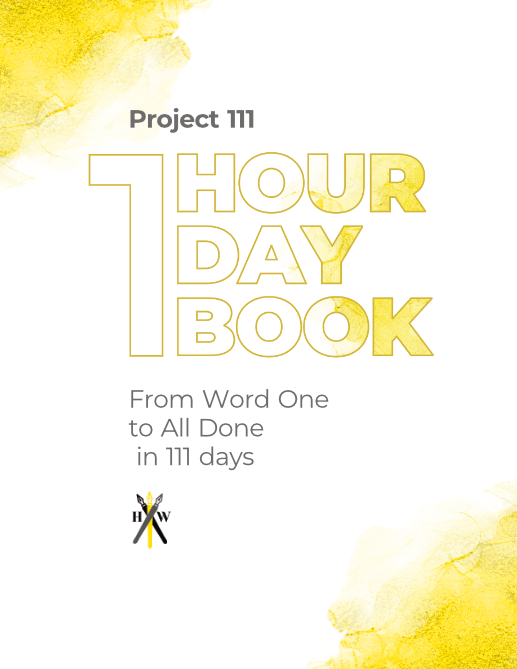One of the most effective ways to become a better writer is to set goals. But if you’re anything like me, you detest goal setting and the “goal culture” that turns life into a never ending uphill battle, completely unsettled with what you’ve achieved. That being said, I have seen the merit of setting writing goals and have even learned to enjoy making them.
The great thing about writing goals is that they can be extremely quantitative and easy to track or more quality based with practice. We’ll discuss different ways to set goals and how to turn your goals into actual words on the page. After all, writers write, right?
Table of Contents
S.M.A.R.T. goals
Hearing “SMART goal” makes me cringe because of its formulaic mindset. This method works for people who enjoy organized methods, but the ideas behind the SMART goals process have the ingredients for successful goal setting and can be translated into whatever means work best for you.
S.M.A.R.T. goals use an acronym: Specific, Measurable, Achievable, Relevant, and Time bound.
Specific

Specificity is important for goal setting, especially writing, because having a new years resolution of “I want to be a better writer” won’t get you far. Certainly you can want that thing, but getting to that point takes specific goals.
You can have the goal of “I want to write better chapters” or “I want to write fully developed characters.” When you have specific goals like these, it’s easier to look at the steps you need to take to get there. By having more specific goals, you can fulfill the larger, more nebulous goals in the meantime.
If you want to qualitatively improve, the more specific you can get, the better you can create goals to support that effort. If it’s quantitative, finishing the goal will simply be a matter of mathematics and diligence.
Measurable

This portion of the SMART goal methodology most easily suits quantitative goals like “I want to finish an 80,000 word book.” When you have quantitative goals, use this portion of SMART goal setting to figure out how many words you need to write a day, week, or month to accomplish your goals.
If your overarching goal is qualitative, deciding your indicator of progress will help improve your goal setting process.
Let’s return to the idea of writing better chapters. This goal is specifically about chapters, but it doesn’t necessarily dictate how many words you need to write or how many chapters. Your job here will be to find some way to structure your progress.
That can look like any number of things. Some ideas might be to rewrite the same chapter multiple times until you find what you like the best. Maybe you’ll have someone you trust score your chapters and try to figure out how to keep improving that number.
The important thing with this step is to have the ability to measure your goal. Once you’ve figured that out, remember that if you miss some days on your goal, you can always do better. Just because you may miss a week writing doesn’t mean you need to abandon your measurements. Keep trying! It’s a process and no process is perfect.
Achievable

This portion of the SMART goal is probably the simplest; just make sure your goal can actually be done.
If until this point you haven’t finished a novel before, setting a goal to finish four novels in a year might not be plausible (unless you’ve almost finished four different books, each needing only a little more work). Instead, try making a goal where you finish one novel’s first draft.
When thinking about an achievable goal, be as realistic as possible, while still pushing yourself towards something that will challenge you. Break down the goal into sections, determining what you can achieve over the course of your time period. If you give yourself a year to finish a 50,000 word novel, figure out how many words a day you need to write.
When doing words per day, remember to schedule days for breaks. Keeping weekends off may be a good idea, or don’t schedule time to write on your otherwise busiest days. Part of the writing process is letting your work sit and letting your brain ponder.
Most important thing is to know yourself and find the sweet spot between totally doable and something that will push you.
Relevant

The “relevant” section of SMART goal setting asks that your created goal serves you in the most optimal way possible. Basically, if you want to improve your writing skills, a goal about watching hockey might not be the most relevant.
To determine if something is relevant, figure out if it makes you better or if it’s just wasting time. If you set a goal and find that it only serves as a distraction, or even detraction, then the goal is irrelevant.
Do something that will improve your writing. Setting goals will make you a better writer if, and only if, you set relevant goals and do your best to follow through with them.
Time Bound

Ensuring that your goal has a time restraint may seem restrictive, but doing so will only help you achieve those things you want to do.
In art, restrictions breed creativity. Having a piano with an infinite number of keys won’t do you any good because you already have an infinite creating capacity with the 88 given keys.
Similarly, a goal won’t do you any good if you have no constraint on it. If you say you want to write a book but don’t have a closing time, “doing it later” will forever be a viable statement. Deadlines help remove our proclivity to procrastinate.
Having an end date for your goal will help you raise the stakes and heighten your motivation.
Further Considerations
This goal setting method won’t be perfect for everyone, and sometimes you’ll make a SMART goal and find that, despite doing everything right when setting it and following through, it seems lackluster.
Find out for yourself what works best. We mention SMART goals only because the goal-setting principles found in the acronym should help you decide for yourself how to set the goals. Here are a few other principles to consider.
Accountability

To its core, each element of goal setting should help motivate you to improve something (usually about yourself or a project). Including a means of remaining accountable to someone could greatly increase your ability to accomplish what you set out to achieve.
Ensuring accountability has various appearances. Most often accountability looks like informing someone else that you’ll report to them about your progress. Sometimes it won’t even be that you’re reporting to them, but you tell them to ask you about it every once in a while.
Having another person aware of your goals can greatly increase your desire not to slough off whatever work you need to do.
If you can’t be accountable to other people for whatever reason, setting up an excel sheet with a date tracker and the amount of words you’ve written could be a good way to go. This digital setup could help keep track of how much you’ve done and how much you have left to do.
Routine

One of the best ways to follow through with your writing goals is to make a routine of it. So many writers will say that they owe much of their work to routine.
Ensuring that your goal can lead to routine will help you stick with it because following through will become second nature. If you choose to write every morning at 9:30 and set that apart, you’ll quickly get into the groove of writing at that time.
If you plan to make a routine of your goal, your success rate should skyrocket. Rather than make a goal then figure out the habit, make the habit then figure out the goal. After all, we love habit writing at Habit Writing.
Incentive

Incentives (whether positive or negative) can be powerful motivators to keep up with your goals.
A positive incentive is something like, “Okay, if I reach my goal this week, I will treat myself to a tub of ice cream” or maybe it’s “If I get this writing done on time, then I’ll let myself binge this new TV show.”
A positive incentive puts gold at the end of the rainbow, except it’s actually reachable.
Negative incentives function in the opposite way. Let’s pretend you wanted to write 15,000 words this month. You tell yourself, “If I don’t get these words written, I’ll unplug my PlayStation for a week.” It could be just removing the things that distracted you from your goal. If you scrolled social media too much, delete it as a negative incentive.
Basically, negative incentives will be punishment for not doing what you hoped to accomplish.
Mixing positive and negative incentives can supercharge those motivations. For example, let’s say you and a writing friend decide to have a friendly competition involving positive and negative incentives as motivation.
You decide you will each write a certain number of words every day. At the end of the goal, you and this person will go do something you both really enjoy (that requires money). This is the positive incentive. You both will want to participate in the activity.
The catch is that the person who missed more days of writing, or whoever wrote less, or whatever stipulation you agree upon, will have to pay for the activity. The negative incentive comes from losing money (along with the knowledge you lost a bet).
Obviously, this example also plays into accountability, but the motivations mostly come from the incentives. If you don’t have anyone to be accountable to, try finding another way to combine positive and negative incentivization.

Our 84-page book planner and 111 day writing course.
You Can Do It!

Remember, the whole point of setting goals is to get better.
By following the SMART goal method, you can create a framework that will guide you to actually finishing them. You can create the goal in a step-by-step way that will help you over and over again.
Or, if you’d prefer, you can internalize the principles and create more free-roaming goals. If you do so, remember that accountability, routine, and incentives can help you stay on track with your goal and reach the end with satisfaction.
For ideas on things to create goals about, check out our other articles!
gavinwride
Gavin is a fantasy author, short story enthusiast, and nature lover. When he’s not reading, writing, or exploring the outdoors, he is likely playing games. His board game collection is probably too big for someone living in a small apartment, and he has enough yet-to-be-played video games to fill a lifetime. His favorite book is "The Name of the Wind". His favorite author is Edward Abbey. His favorite game is "Dark Souls III", and he’d be more than happy to spend the day talking about lore, bosses, and game mechanics.
Our 84-page book planner and 111 day writing course.
